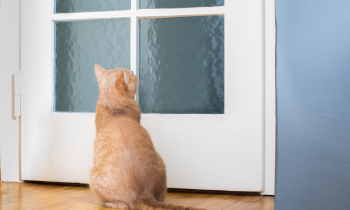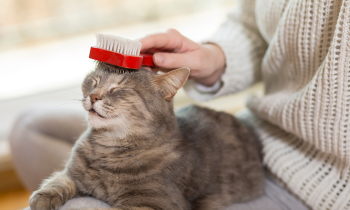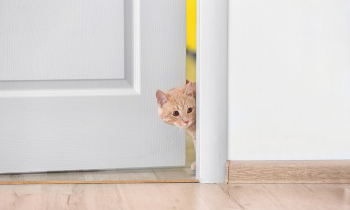
You’ve probably noticed more than once how your cat starts following you around when you pee or bathe. It’s common for a cat to stay behind the door and wait for the owner to come out.
Locked doors make the situation worse. The cat will meow and scratch at the door, trying to get in.
Cats are freedom-loving creatures by nature, and most prefer to be near people or their owners. This way, felines feel more needed and protected. Some breeds of cats, such as Sphinxes and Siamese cats, are considered more demanding and intrusive.
To understand what causes such unusual behavior in your beloved pet, read our detailed research below.
Furry friends may accompany you to the bathroom, toilet, or other places for various reasons. Cats may do this to express their love and affection, out of curiosity, to show you they are thirsty or hungry, they can feel anxious and lonely, seek owner’s attention, or to mark their territory.
10 reasons why cats follow You When You Pee or Take a Bath
Some of the most common reasons your furry kitty may follow you everywhere include the following:
Love and affection

No matter how trite it may sound, one of the reasons cats follow you around is because they love you so much. This unconditional love and loyalty make a feline follow its owner everywhere and miss him in his absence.
Despite their apparent independence and detachment, cats can have deep feelings for those who tame them. Thus, your kitty wants to be close to you, see you more often, and spend time with its owner as often as possible.
Your fluff ball enjoys every moment spent with you! By following you to the bathroom or toilet or disturbing your daily activities, your pet signals you to be near and observe your beloved owner. Your cat adores it when you pet it or pick it up from time to time.
If the cat starts to damage and scratch the furniture, drop objects, tear things, run around the apartment, or scream, it clearly wants to attract your attention to itself. However, such behavior can also be a sign of hidden health problems, both mental and physical.
If your feline continues to behave badly after getting enough affection and attention, we strongly recommend to visit a vet to identify potential health problems.
Curiosity
Felines may accompany their owners to the bathroom or the toilet out of curiosity. They love to watch after their owners, even if it happens in the bathroom.
Cats love to see what their owners do, whether they are working on PC, cooking, watching TV, doing laundry, or exercising.
In addition, the bathroom interests cats because it has flowing water, plenty of exciting things to play with, and additional places to sleep in.
Felines are also interested in smells, so they often explore scents in the bathroom and toilet.
An established daily routine
Your cat can synchronize its usual routine with yours because it is used to it. Your fluff friend needs an unchanging regimen that it sticks to.
Therefore, the feline will often accompany you during the morning procedures at the same time: when you shower and go to the bathroom, have breakfast, or go to work.
This way, cats feel a sense of stability and comfort at your side. Moreover, they become calmer and less stressed.
If you want to change your schedule, you must make a new one and get your cat used to it.
Protecting the territory and the owner
Cats tend to guard their territory, so it’s common for them to leave their tracks on whatever they think is theirs. As a result, your pet may follow you to mark things it “owns” in the house.
Felines perceive you as their protector, so they may feel uncomfortable and vulnerable when you close the door to the bathroom or toilet. They want to check what you are doing to protect themselves and you from potential dangers.
Instead of avoiding your cat, try to walk with it allowing to entertain outside. In nature, your fluff ball will hopefully find something interesting to do, that will distract its attention.
Hate of the Closed Doors
Cats can’t stand secrets. If you close the door to the bathroom, toilet, or any room, your kitty will scratch and meow to find out what’s happening behind the door.
Felines hate closed doors, so if possible, try not to close them tightly, allowing your kitty to open them on its own.
Indoor Heat
If your cat is too hot, it may follow you to the bathroom to find cool spots in the sink, shower stall, or tile floor. Give your pet a chance to feel relieved on a sweltering day, especially in the summer.
To keep the kitty from rushing to the toilet, try turning on a fan or air conditioner to improve the situation. You can also buy special cooling mats designed specially for cats. You can quickly put them in the refrigerator and after some time put them beneath your pet.
Thirst
If your furry friend enters the bathtub too frequent, it may be because it is thirsty. The bathroom is attractive for cats because there are many water sources, such as taps, shower heads, buckets of water, etc. Felines can even use the toilet bowl to drink from it.
If your cat frequently follows you to the bathroom and toilet, check if it has enough water. Ensure there’s always fresh water in the bowl, or get a special drinking fountain.
Pet fountains pour the water into a cat’s bowl in portions. This way the feline will have a constant access to fresh drinking water.
Hunger
If your cat constantly watches or follows you, it may be hungry. Check your fluffy cat’s bowl; maybe you just forgot to feed it.
Try to give your fluff friend food in time or use automatic feeders, which will dispense food if the bowl is empty. After doing this, your cat will most likely stop chasing you.
If your cat is standing near a full bowl and meowing, perhaps it does not like the food you gave and wants something else. A gradual food change may solve the problem.
Establish a feeding schedule for your pet. For example, you can feed your cat every morning at 8 a.m. You can also divide the feedings into two parts, giving one half in the morning and another half in the evening.
This way you cat will accustom to a certain feeding hours and understand when to expect food. As a result, your pet will stop bothering and distracting you all the time.
Demanding attention and calling for play

Being social creatures, cats demand a constant interaction and attention to their personality. If you don’t spend enough time with your feline, rarely pick it up, pet, or play with it, it will try to find the lacking attention following you everywhere, even to the toilet.
Thus, felines try to draw their owner’s attention at any cost. Your kitty shows you its attachment, and wants to communicate with you at the slightest opportunity.
Some cats even like to sit on the owner’s lap while going to the bathroom, which can be quite uncomfortable for humans, but gives great pleasure to the cat.
Separation Anxiety and Stress
Some cats may suffer from a long separation from their owner, stress from loneliness or feeling of being unwanted. This behavior may appear as constant meowing, restlessness, or following the owner around the apartment.
Try to give your kitty interactive educational toys to distract it from feeling lonely or separated during your absence.
In addition, there are special pet cameras, which allow the cat and the owner to see each other, even at a distance. Why not test them out?
If the feline is bored, try to buy a cat tree. It will be able to climb, hide and sharpen its claws simultaneously. These funny activities will make the cat feel busy, and it won’t suffer from loneliness when you’re not home.
When you have more free time, spend it with your cat. Your attention, love, and care are the best present for your fluff ball!
Take the feline in your arms, caress it, play its favorite games, and you will see how it becomes even more attached to you.
Sudden changes in the cat’s behavior for no apparent reason should alert you. If a cat meows constantly, cannot go to the toilet, vomits, refuses to eat, or is too aggressive, this also may be a sign of an illness. If this happens, visit your veterinarian to avoid a serious health problem.
FAQs
How can I tell if a cat is too clingy?
If a cat occasionally follows you around the apartment, don’t worry, as in most cases this is normal. Your love and attention should prevent this situation. But, if this behavior is repeated regularly and is independent of the above causes, you should consult a specialist.
What should I do if my cat is constantly following me?
First of all, you must look into the causes of such cat behavior. If, after careful observation, you have not been able to identify why the feline always accompanies you, some methods will help your cat understand you need to be alone without somebody’s company from time to time.
To wean the cat off following you to the bathroom, toilet, or room, try to take it away from the bathroom door to another room where its favorite toys, food, or place to sleep are located. Repeat the process as many times as needed.
Constantly playing with your pet in a specific place in the apartment should prevent such behavior. This way, the feline gets used to the specific cat area in the house and will wait for you there.
You can also choose not to play with the cat when it is sitting outside the door and give it a treat after you leave the room. This way, you will train it to wait for your return without violating your personal boundaries.
Should I encourage the cat to be so intrusive?
Try not to encourage the cat’s intrusive behavior to avoid any further unpleasant issues in the future.
If the mentioned methods do not work, you should schedule a consultation with a veterinarian to identify other possible mental or health problems that may have caused the compulsive behavior.
Conclusion
In general, cats follow us around because they love us and want to be near us. If your furry kitty walks into a room, rubs up against your feet, and continues to follow you wherever you go, this is perfectly normal behavior.
Ensure you give your cat enough love and attention to keep it happy and healthy. If your feline isn’t eating well, has become less playful, or is acting clingy, it could be a sign of stress or illness.
If you notice unusual behavior in your cat, it is best to consult your veterinarian to make sure it has no health issues.
The doctor will be able to determine if your pet has a behavioral or health problem and will prescribe the necessary treatment.

